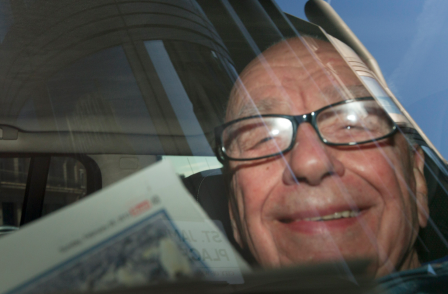
Was the hacking scandal actually the best thing that ever happened to Rupert Murdoch?
This was the question posed by Peter Preston in The Observer yesterday.
The Guardian's revelation of July 2011 that News of the World journalists had listened to the voicemail messages of Milly Dowler prompted the closure of the News of the World and scuppered News Corp's bid to buy the 61 per cent of BSkyB that it did not already own.
But now News UK (formerly News International) publishes The Sun on Sunday at a fraction of the cost of the News of the World and sales wise it is not too far off where the News of the World would have been.
The scandal prompted the split of News Corp into two parts in January 2013: News Corp (publishing and newspapers) and 21st Century Fox (TV and film).
The result, Preston notes, is a combined market capitalisation of $87.4bn today compared with £34bn at the height of the hacking scandal.
He quotes media analyst Clare Enders who reckons the Murdoch family's holding in News Corp has increased by $6bn since 1 July 2011.
Preston believes that Murdoch's political influence in the UK is now low: "His endorsement for May 2015 is resolutely not sought by any party: rather, shunned, like some toxic leak."
What else has changed since July 2011?
In my view there has been a big change in the culture of Fleet Street. News UK probably has some of the most tightly-regulated journalists in the world. Cash payments for stories are pretty much a thing of the past (requiring sign-off so high in the company that it is made in the US rather than Wapping).
Voicemail interception is also obviously a thing of the past too (though that change goes back to the 2007 convictions of Goodman and Mulcaire, with the apparent exception of Dan Evans who has pleaded guilty to phone-hacking for the News of the World up to 2010).
And we have a new press regulator in the Independent Press Standards Organisation which is not completely independent in terms of the way it is constituted, but at least has a thoroughly independent chair in Sir Alan Moses. Unlike the PCC it has the power to investigate allegations of serious wrongdoing, call editors and journalists to account for themselves and (in exceptional cases) issue fines of up to £1m.
The hacking scandal has cost News Corp hundreds of millions in legal costs plus the closure costs of the News of the World. And it has lost many billions in revenues from missing out on the BSkyB deal.
So I suspect News Corp might be worth even more today if the hacking scandal had not happened.
But in terms of creating a UK journalism culture which is more conscious of ethics and the law and where journalists have protection for the first time from pressure to act dishonestly (via the IPSO whistleblowers hotline) I think it may ultimately be a good thing for our industry.
Email pged@pressgazette.co.uk to point out mistakes, provide story tips or send in a letter for publication on our "Letters Page" blog
